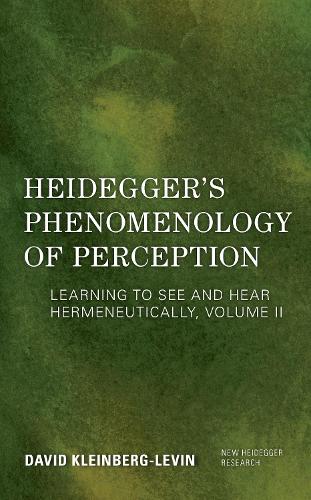
Heidegger's Phenomenology of Perception: Learning to See and Hear Hermeneutically
(Hardback)
Available Formats
Paperback
Published: 21st October 2019
Hardback
Published: 23rd October 2019
Paperback
Published: 6th January 2021
Hardback
Published: 10th December 2020
Publishing Details
Heidegger's Phenomenology of Perception: Learning to See and Hear Hermeneutically
By (Author) David Kleinberg-Levin
Bloomsbury Publishing PLC
Rowman & Littlefield International
10th December 2020
United Kingdom
Classifications
Professional and Scholarly
Non Fiction
121.34
Physical Properties
Hardback
380
Width 161mm, Height 231mm, Spine 34mm
726g
Description
In volume I, Kleinberg-Levin interprets and defines the five key words in Heideggers project. In this second volume, he makes use of these words, illuminating their specific concrete meaning and significance for Heideggers phenomenology of perception and his philosophy of history. At stake in Kleinberg-Levins project, coming after Heidegger, is the possibility of another experience and understanding of being. Concentrating on the appropriation of seeing and hearing as capacities and capabilities bearing promising potentialities that could be developed, he shows how these modes of perception should be understood in the context of Heideggers critique of the history of metaphysics, wherein vision has served as paradigm for knowledge, truth, and reality. He also shows that seeing and hearing need to be understood in the context of Heideggers philosophy of history, in which seeing and hearing are both given a role in the transformation of the character of our humanity, redeeming their own inherent potential. Kleinberg-Levin shows how and why, in the world of today, the formation of the perceptual Gestalt has undergone an accelerating process of deformation and reification, encouraging a disposition for violence that makes perception serve unrelenting technological and technocratic imperatives; and he shows how we might begin to redeem the promising potential in seeing and hearing, turning their damaged and dehumanized character, and their violence, into ways of taking part in the creation of a new planetary existencewhat Heidegger imagines through the topology of the fourfold, the gathering of earth and sky, mortals and their gods, around all the things we live with. Retrieving the latent potential in our seeing and hearing for the sake of a better, more benevolent world, another epoch in the history of being, Kleinberg-Levin proposes important new ways to experience and think about the fundamental disposition of these capacities and capabilities, emphasizing our responsibility, not only for the beings that pass through our world, but for being itself, namely, the opening of a perceptual field, a universe of discourse, a world: the necessary conditions for experiencing beings in regard to their being. This responsibility, he argues, summons us to the response-abilities befitting our true humanity. Thus, the subtitle for this volume: Learning to See, Learning to Hear. Concentrating on the development of our natural capacities, Kleinberg-Levin explores the question of our potential for growing in our humanity, growing in our sense of what it means to be human. In this way, he connects his thinking, after Heidegger, not only to the history of European thought, but also to the philosophical contributions of Emerson and Dewey, the best among the Americans to continue the Enlightenment Project.
Reviews
In this second volume of his Heidegger's Phenomenology of Perception, David Kleinberg-Levin pursues his exploration of the ontological dimension of embodiment, in particular the modes of seeing and hearing. Developing chapters on the key words of Gestalt, Gestell, Gelassenheit and Geviert, Kleinberg-Levin offers a brilliant and original work on how Heidegger's thought contributes to a phenomenology of perception and hermeneutics.
Author Bio
David Kleinberg-Levin is professor emeritus of philosophy at Northwestern University. Books: The Bodys Recollection of Being (1985), The Opening of Vision (1988), The Listening Self (1989), The Philosophers Gaze (1999), Gestures of Ethical Life: Reading Hlderlins Question of Measure After Heidegger (2005), Before the Voice of Reason: Echoes of Responsibility in Merleau-Pontys Ecology and Levinass Ethics (2008), Redeeming Words and the Promise of Happiness: A Critical Theory Approach to Wallace Stevens and Vladimir Nabokov (2012), Redeeming Words: Language and the Promise of Happiness in the Stories of Dblin and Sebald (2013), Becketts Words: The Promise of Happiness in a Time of Mourning (2015), Heideggers Phenomenology of Perception: Introduction, vol. 1 (London: Rowman & Littlefield International, 2019), Heideggers Phenomenology of Perception: Learning to See, Learning to Hear, volume 2 (Rowman & Littlefield International, 2020).
